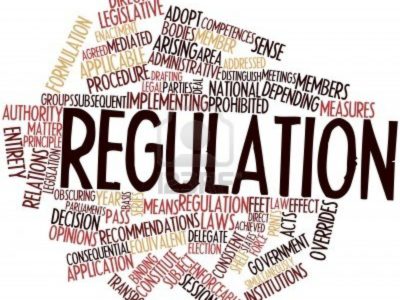Chevron Doctrine
Regulatory Reform: A Progressive Vision
A new Issue Brief provides practical proposals on how to improve regulation.
For over three decades, “regulatory reform” has been an aspiration chiefly for opponents of regulation. Everyone agrees that regulation could be improved. But too many proposals for change are designed to undercut protection of the environment, public health, and civil rights. What would regulatory reform look like if you actually want to improve regulation rather …
Continue reading “Regulatory Reform: A Progressive Vision”
CONTINUE READINGTwo Years and Counting: Looking Forward
What’s the prognosis for the second half of Trump’s term?
In terms of regulatory policy, the second half of Trump’s term is shaping up to look a lot like Obama’s final two years in office. Congress won’t be doing much to advance Trump’s environment/energy agenda, as was the case with Obama. So, like Obama, Trump’s focus will be on administrative action, particularly regulatory initiatives (or …
Continue reading “Two Years and Counting: Looking Forward”
CONTINUE READINGProgressive Regulatory Reform
Suppose that, like conservatives, progreessives started thinking about reforming the regulatory system. What would that look like?
Until recently, you could be a very well informed American – a lawyer, even – without ever having heard of the Chevron doctrine. That has changed enough that last month the New Yorker had a “Talk of the Town” essay discussing Kavanaugh’s views of the Chevron doctrine. The reason for the attention to Chevron is …
Continue reading “Progressive Regulatory Reform”
CONTINUE READINGEPA Makes a Pit Stop at the “Chevron” Station
EPA’s latest proposed rollback relies heavily on the Chevron Doctrine.
The ACE rule, The Trump Administration’s proposed rule for carbon emissions in the carbon sector, purports to regulate greenhouse gases from power plants. Its real goal seems to be minimizing the burden on coal-fired plants. Legal Planet has already carried some excellent posts about the proposal’s policy flaws. I’d like instead to talk about its …
Continue reading “EPA Makes a Pit Stop at the “Chevron” Station”
CONTINUE READINGTrump’s Contradictory Policies
Trump’s policies clash with each other remarkably often.
A certain amount of policy inconsistency is inevitable in any Administration. But the Trump Administration seems to be breaking all records. The Administration does have strong impulses. The trouble is that its goals keep colliding. Here are some examples. Favoring gas at the expense of coal. . . And vice versa. Trump wants to promote …
Continue reading “Trump’s Contradictory Policies”
CONTINUE READINGThe Chevron Doctrine: Is It Fading? Could That Help Restrain Trump?
The Supreme Court may be shifting the rules for reviewing agency interpretations of statutes.
In June, the Supreme Court decided two cases that could have significant implications for environmental law. The two cases may shed some light on the Court’s current thinking about the Chevron doctrine. The opinions suggest that the Court may be heading in the direction of more rigorous review of interpretations of statutes by agencies like …
Continue reading “The Chevron Doctrine: Is It Fading? Could That Help Restrain Trump?”
CONTINUE READINGAgency U-Turns
Policy reversals are likely to be more frequent in an increasingly polarized society. How should courts respond?
The Trump Administration is doing its best to wipe out Obama’s regulatory legacy. How will the courts respond to such a radical policy change? The philosophical clash between these last two Presidents is especially stark, but this is far from being the first time that agencies have taken U-turns. This is the fifth time in …
Continue reading “Agency U-Turns”
CONTINUE READINGMercury Rising: The Court Reverses EPA’s Regulation
This was not a great decision for EPA, but it could have been much worse.
The Court has just now decided the Michigan case, involving EPA’s mercury regulation. As Ann Carlson explained in an earlier post, a lot was at stake in the case. The Court ruled 5-4 against EPA. This passage seems to be key to the Court’s reasoning: One would not say that it is even rational, never mind …
Continue reading “Mercury Rising: The Court Reverses EPA’s Regulation”
CONTINUE READINGFDA Discretion and Animal Antibiotics
FDA has stalled for 30 years in regulating antibiotics in animal feed. A court says that’s O.K.
The FDA seems to be convinced that current use of antibiotics in animal feed is a threat to human health. But the Second Circuit ruled recently in NRDC v. FDA that EPA has no duty to consider banning their use. That may seem ridiculous, but actually it’s a very close case legally. The court’s discussion of Massachusetts …
Continue reading “FDA Discretion and Animal Antibiotics”
CONTINUE READINGToday’s Supreme Court Ruling: Three Key Questions
Direct implications are limited, but we’ll be reading the tea leaves for future implications.
Scholars, lawyers, and judges will be spending a lot of time dissecting today’s ruling. Overall, it’s a bit like yesterday’s World Cup game — EPA didn’t win outright but it didn’t lose either. Here are three key questions with some initial thoughts: What is the direct legal impact of the ruling? This was really …
Continue reading “Today’s Supreme Court Ruling: Three Key Questions”
CONTINUE READING









